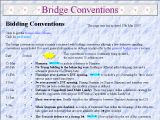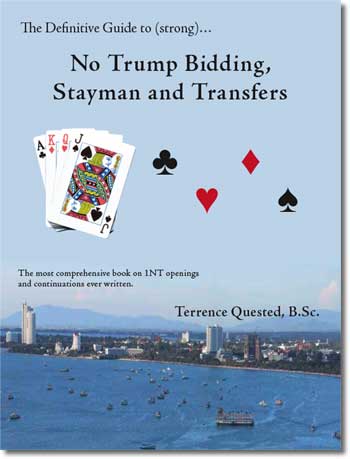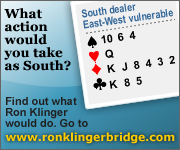Mon 21st 1st Arin & Rochelle 59% 2nd Mike g & Kenneth 56%
Wed 23rd 1st Dino & Per-Ake 63% 2nd Sally & Martine 63%
Fri 25th 1st Jan & Michael S 69% 2nd Sean & Terje Lie 55%
| to news-sheet main page |
 |
||||
| to Pattaya Bridge home page |
|||||
 |
to bridge book reviews | to bridge conventions | to No Trump bidding | ||
| to bridge CD's and computer games and software | |||||
Bidding Quiz Standard American
bidding is assumed unless otherwise stated.
Hand A Hand B With Hand A you open 2♥ and LHO overcalls 2♠. Partner
doubles, what do you bid?
♠
65 ♠ KJ9752
♥ KQ10875 ♥
7 With
Hand B it’s unfavourable vulnerability. You open 1♠ and
♦ Q108 ♦ AK103 LHO
bids 3♥, partner bids 4♥ (good ♠ raise) and
♣ 54 ♣ 63 You bid 6♠ passed to
Hand C Hand D With Hand C partner opens 1♦, what do you bid?
♠
Q82 ♠ AJ103
♥ KQ4 ♥ A With
Hand D partner opens a weak 2♥ and
♦ Q42 ♦ A9432 2♠. What do you do?
♣
KQJ10 ♣ Q109
Hand E Hand F With Hand E partner opens 1NT, how do you plan to bid
the hand?
♠
A ♠ AK10
♥ A53 ♥ AK74
♣
J94 ♣ AKJ74 bids
negative or waiting according to your agreements.
G 1♠ 3♥ 4♥ 5♥ The
final pass is obviously forcing, asking partner to
6♠ pass pass 7♥ either double or bid 7♠, but what does it say about
pass opener’s
♥ holding? And what would a double show?
H 2♥ 2♠ dbl What
is the double; penalties, negative or what?
J 2♣ pass 2♦ pass How
do you play this 3NT rebid after opening 2♣?
3NT
K 3NT How
do you play the 3NT opening?
It’s Penalties! Board 5 from Monday 21st June
I think there were dubious bids at both of these tables.
Dealer: ♠
65 Table
A
North ♥ KQ10875 West North East South(D)
N-S vul ♦ Q108 - 2♥ 2♠ 2NT (1)
♣ 54 all
pass
♠
8 N ♠
KQ9742 Table B
♥ 32 W E ♥ J964 West North(A) East South(D)
♣
AJ8763 ♣
♠ AJ103 all pass
♥
A
♦ A9432
♣ Q109
(2) What did you bid with this North hand A in this
week’s quiz? When you pre-empt then partner is the captain and there is no reason
to bid again. There is no excuse whatsoever for North to remove partner’s
double, especially when holding two ♠’s.
(3) Pass is wiser, but South was presumably annoyed
at seeing the penalty slip away?
And what happened? 2NT-3, 4♥-2,
3♥=, 2♥+1
and 2♠(E)-2.
The bottom lines:
-
When
partner opens with a pre-empt and
-
Don’t bid
again if you open with a pre-empt; partner is the captain.
Bid your hand in one go Board 20 from Monday 21st June
If there is a bid that describes your hand in one go, then that usually
is the best bid.
Dealer: ♠
K9 Table
A
West ♥ J10985 West North East(C) South
both vul ♦ 8753 1♦ pass 2♣ (1) pass
♣ 63 3NT (2) pass pass (3) pass
♠
A3 N ♠ Q82 Table B
♥ A72 W E ♥ KQ4 West North East(C) South(D)
♣
A94 ♣ KQJ10 6NT (4) all
pass
♠ J107654
♥
63
♦ J
♣ 8752
And what happened? With the ♦J
dropping there are obviously 13 tricks off the top but an initial ♠ lead from South was a problem and caused a
safety play at two tables. So 6NT=, 3NT+4 three times and 3NT+3.
The bottom lines:
-
If there
is a bid that accurately describes you hand, then bid it!
A forcing pass Board 15 from Monday 21st June
All four players here were pretty experienced with good bidding right up to the last hurdle – which the N-S pair had not discussed.
Dealer: ♠
AQ64 West North East South(B)
South ♥ 9 - - - 1♠
N-S vul ♦ QJ7 3♥ 4♥ (1) 5♥ (2) 6♠ (3)
♣ AKQ94 pass pass 7♥ (4) pass (5)
pass 7♠ all pass
♠
10 N ♠ 83
♥ KQJ8432 W E ♥ A1065
♣
82 ♣
J1075 (2) Making a
Blackwood bid impossible.
♠ KJ9752 (3) Who needs Blackwood?
♥
7 (4) East is sure that 6♠ makes, and 7♥ should
♦ AK103 cost only 1100 or 1400.
♣ 63
(5) Now it’s crunch time for N-S! What did you bid
with this South hand B in this week’s quiz? South passed (obviously forcing)
and North assumed that this showed 1st round ♥ control and so bid the grand. The ♥K lead spelled defeat.
So how do you play forcing passes? Have you ever discussed it? I guess you can play it how you like, but Paul Q and myself believe that our treatment is ‘standard’. We pass with first round control and double without it. Apparently both Janne and Jeremy play it the other way round.
And what happened? Two others bid 6♠
but nobody else found the 7♥ sacrifice. Two
N-S’s stopped in 5♠ for reasons beyond my comprehension.
The bottom lines:
-
The
forcing pass is a fairly complex bid which established partnerships need to
discuss. Indeed, Paul Q informed me that he has had so many problems with
various partners with the bid over the years that he does not really like to
use it!
-
As for the
two who stopped in 5♠. I don’t know their
bidding, but if you use Blackwood and find that there is one ace (or keycard)
missing then you should bid the slam – one should not use Blackwood to gauge
strength, the strength should already have been established and Blackwood is
used to check for top losers.
Dave’s Column Here is Dave’s
first problem on the play of the hand.
♠
A8 ♠ K973 West North East South
♣
KJ1087 ♣
A65
Dave’s Column Board 20 from Wednesday 23rd June
Dealer: ♠ 542 Book Bidding
West ♥ 84 West North East South
both vul ♦ 765 2NT pass 6NT all
pass
♣
Q9432
♦ AKQ S ♦ 1098
♠ QJ106
♥
J6532
♦ J432
♣ -
In the article, declarer led a ♣ to dummy’s ♣A at trick two, if the missing ♣’s
broke 3-2 or 4-1 then there may be a ♣
loser but that would be all. Even if all 5 ♣’s lay with South there would be 4 ♣
tricks. Unfortunately when South showed out the slam went one down.
The correct play at trick two is to play the ♣J and let it ride if North plays low. If South
wins with the ♣Q then declarer has the rest. There are always
4 ♣ tricks, and thus the slam, on any distribution
of the ♣ suit if the ♣J is initially led.
Actually, a ♣ to the ♣A would have succeeded (by end-playing North)
but the safety play guarantees the slam.
And what happened at the Pattaya bridge club? 6NT=,
3NT+3 twice and 6NT-1.
Dave’s 2nd
Column Here
is Dave’s second problem, on the play of the hand.
♠
- ♠ K97532 West North East South
♣
AKQ9875 ♣ J2 pass 5♣ pass 6♣
all pass
You are North, declarer in 6♣. East leads the ♦6, where do you win the trick and what do you play at trick two? Plan
the play.
Dave’s
2nd Column answer Board 21 from Wednesday 23rd
June
Dealer: ♠ - Book Bidding
North ♥ AK West North East South
N-S vul ♦ A754 - 2♣ pass 2♠
♣
AKQ9875 pass 3♣ pass 3♠
♠ AQJ N ♠ 10864 all
pass
♠ K97532 East leads the ♦6, plan the play.
♥
542
♦ K3
♣ J2
In the article, declarer won the opening lead
with dummy’s ♦K and led a 2nd ♦ to his ♦A.
East ruffed and shifted to a ♣. North won in his
hand and ruffed a ♦ with the ♣J
but his last ♦ was a loser – so down one.
A trump opening lead would beat 6♣, but after East’s opening lead is not a trump
North can safeguard the slam by taking the ♦K and then playing a low ♦
from both hands. He wins West’s trump return and ruffs his last low ♦. Ruff a ♠
to hand and draw trumps to get the rest of the tricks.
And what happened at the Pattaya bridge club? 6♣=, 4♦*(W)-5,
3NT-4 and 3NT+2.
Play Problem
♠ 2 ♠ QJ West North East South
♣
983 ♣ KQJ10 4♥ all
pass
Play
problem answer Board
1 from Friday 18th June
Dealer: ♠ 976 West North East South
North ♥ Q84 - pass 1NT pass (1)
Love all ♦ J852 2♦ pass 2♥ pass
♣
A75 4♥ (2) all
pass
♠ 2 N ♠ QJ (1) Obviously South should bid ♠’s, but this
♠ AK108543
♥
J South
led the ♠A and switched to a ♣. North returned a
♦ Q9 ♣ which declarer won. He led a trump to the ♥K and
♣ 642 noted
the ♥J from South. Assuming that South would play
the ♥J or ♥Q
randomly from this doubleton, Declarer should now finesse North for the ♥Q. This is NOT a 50% guess but a 66% example of
restricted choice.
And what happened? East played for the ♥’s to split 2-2 and so made the contract
exactly instead of with an overtrick, but this was still a top as at the other
tables N-S played in ♠’s; 3♠= and 4♠*-2.
One of my pet hates Board 18 from Friday 25th June
How do you play sequence J in this week’s quiz?
Dealer: ♠
974 West North East South(F)
East ♥ QJ93 - - pass 2♣
N-S vul ♦ 109432 pass 2♦ pass 3NT (1)
♣ 9 pass pass (2) pass
♠
8532 N ♠
QJ6 (1) What did you
bid with this South hand F in
♥ 1086 W E ♥ 52 this week’s quiz? This jump to 3NT (or a
♣
Q832 ♣ 1065 was chosen by
two players on Friday. When
♠ AK10 partner is very weak he will not want to bid
♥
AK74 Stayman
or transfer and get one level higher.
♦ A (2) North risks a 4NT contract if he tries
Stayman.
♣ AKJ74
This is a classic example, and here a ♥ contract makes 13 tricks whereas 3NT makes
only 10 tricks. What’s the solution? Never use sequence J! You need to be able
to show the very strong hand with a 2NT bid so that partner can use Stayman or
transfers below the level of 3NT. If you play the Multi 2♦ then use 2♣ - 2♦ - 2NT to show 26+ balanced; if you play
Benjamin twos then use 2♦ - 2♥ - 2NT to show 26+; and if you have 2♣ as your only strong bid then play the Kokish
Relay where 2♣ - 2♦ -
2♥ - 2♠
(forced) - 2NT shows 26+. Of course if South chooses a 3♣ rebid with this hand F then a ♥ contact is easily reached.
And what happened? 3NT=, 3NT+2 and 6♥+1.
Dealer: ♠
2 Table
A
East ♥ KJ1075 West North East South
N-S vul ♦ 10965 - - pass 1♠
♣ KJ8 pass 1NT pass 4♠ (1)
all pass
♠
J8653 N ♠
9
♥ 82 W E ♥ Q4 Table B
♣
Q973 ♣ A106542 - - pass 1♠
♠ AKQ1074 pass 1NT pass 3♥ (1)
♥
A963 pass 4NT (2) pass 5NT (3)
♦ K32 pass 6♣ (4) pass 6♠ (5)
♣ - pass 7♥ all pass
And what happened? A real mixed bag: 7♥-1, 6♥*-4, 5♥-1,
4♠-1 and 2♠=
for a top! 4♥ is clearly where you want to play, but I guess
it’s not easy to stop there?
The bottom lines:
-
The void
responses to RKCB were, I believe, devised by Eddie Kantar and they are up on our
website.
-
It’s
perhaps debatable whether the South hand is worth a game forcing jump at its 2nd
turn and it may well be possible to stop in 4♥ if playing Benjamin twos. The sequence could be 2♣ - 2♦ -
2♠ - 3♥ -
4♥ - pass, where 2♣ only guarantees 8-9 tricks.
- I happen to be in the
middle of reading a great book by Sabine Aukin – “I love this Game” and I note
one deal where she used similar RKCB void responses to reach a great slam which
was missed at the other table.
AKQxxx is not 9 points Board 28 from Friday 25th June
Dealer: ♠
K7642 Table
A
West ♥ J1098 West North East(E) South
N-S vul ♦ 85 1NT pass 6NT (1) all pass
♣ 32
♠
J95 N ♠
A Recommended Auction
♥ KQ42 W E ♥ A53 West North East(E) South
♣
AKQ10 ♣ J94 4♥ (2) pass 7NT all pass
♠ Q1083
♥76
♦ 762
♣ 8765
And what happened? Two pairs stopped in 6NT+1 and so did the sit-out
pair after the sequence 1NT – 5NT (invitational to the grand) – 6NT. One pair
bid 7♦= for the top.
The bottom lines:
-
AKQxxx is
worth much more than 9 points, and if partner has opened 1NT (thus promising at
least two) then this is expected to produce six tricks.
-
Looking at this East hand it is
almost certain to make 13 tricks opposite a strong 1NT. In fact the West hand
is nothing special and not maximum but there are 14 top tricks.
-
I cannot really understand the
7♦ bid – surely if 7♦ makes then so does 7NT and you want partner to play the hand as he
may possibly have a tenace in the suit led (perhaps ♣’s or ♥’s).
Current club championship standings
|
|
Gold Cup = Best 30 |
Silver Plate = Best 10 |
Bronze Medal = Best 5 |
|
1 2 3 4 5 6 7 8 9 10 |
1871.3 Janne Roos 1846.9 Paul Quodomine |
658.5 642.1 640.1 626.8 Tomas Wikman 622.1 Sally Watson 619.8 Lars Broman 615.9 Jean Wissing 609.5 Duplessy & Coutlet 597.8 Bengt Malgren 597.3 Jan v Koss |
335.5 329.6 327.9 325.4 Sally Watson 323.4 322.9 Lars Broman 320.3 Jean Wissing 319.5 Duplessy & Coutlet 316.0 Sigurd Zahl 314.2 Niels Krojhaard |
Bidding Quiz Answers
G 1♠ 3♥ 4♥ 5♥ This
sequence actually occurred on Monday and there
6♠ pass pass 7♥ was some disagreement about the meaning of pass.
pass Janne
and Jeremy both passed when holding a singleton ♥ but Paul Q and myself are both of the
opinion that pass shows first round ♥ control and that double would show no first
round ♥ control.
H 2♥ 2♠ dbl Penalties.
Negative doubles do not apply when partner pre-empts.
J 2♣ pass 2♦ pass I
don’t! I think that this is a terrible sequence to show a big
3NT balanced
hand as partner may be too weak to risk Stayman or transfers. I guess you can
use it with a huge hand with no 3-card major and no interest in playing in a
major?
K 3NT Again,
I do not like to play this as a very strong balanced hand. I prefer the
gambling 3NT with absolutely no outside ace or king.


